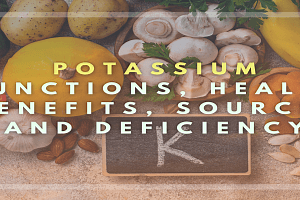Potassium: Functions, Health Benefits, Sources and Deficiency
Created On: Apr 7, 2021

Dr. Chirag Sethi* and Dr. Swarna Anchal**
*Director, Classic Fitness Academy, New Delhi.
**Technical Writer, Classic Fitness Academy, New Delhi.
Introduction
Potassium (K) is one of the important minerals in the body. Our body does not produce potassium naturally so we have to take a balanced diet to fulfill the daily requirement. In our body, 80% potassium is store in muscles and 20% in the liver, RBC, and bones. Recommended daily allowance (RDA) for potassium is 3500-4700 mg/day. Consuming too little can cause serious health issues while high intake can cause temporary or long-term problems.
Functions:
Potassium plays an important role in our body and is critical for various vital functions.
1) Lower blood pressure: An enough potassium intake may prevent high blood pressure. It is recommended that high potassium and low sodium intake can prevent cardiovascular diseases.
2) As electrolyte: It is classified as an electrolyte. When it is dissolved in water, produces charged ions hence this property allows it to conduct electricity which is important for many processes in the body.
3) Helps in nerve impulse and muscle contraction: Potassium is vital to transmitting nerve signals that lead to skeletal muscle contraction, smooth muscle, and heart contraction.
4) Digestion: Potassium helps in taking signals from the brain and sends them to muscles of the digestive system. After receiving the signals, digestive muscles start contractions, and the digestive system churns food so it can be digested.
5) Heart Rhythm: Potassium helps in maintaining heart rhythms.
6) pH Balance: Potassium and hydrogen ions interactions helps in transport at both the cellular and renal levels, which is crucial for the maintenance of acidity.
7) Bone Mineral Density: Optimum potassium intake is considerably associated with an increase in bone mineral density and provides strength.

Sources
Many of the foods naturally contain potassium as listed below. To boost the amount of potassium one should make healthy food choices and pick foods that are rich in potassium.
Fruits: apricots, banana, kiwi, oranges, Pineapple
Vegetables: Leafy greens, carrots, potatoes
Others: Lean meats, Whole Grains, Beans and nuts, Mushroom

Sign and symptoms
Common signs and symptoms of potassium deficiency include weakness and fatigue, muscle cramps and spasm, muscle aches and stiffness, tingles and numbness, irregular heartbeats, breathing difficulties, digestive problems such as constipation, nausea, and vomiting along with mood changes.
Potassium Deficiency
If there is potassium deficiency in the body it is called 'hypokalemia' and there are so many reasons for the conditions such as overuse of diuretics, excess sweating, diarrhea, and vomiting. If the person is suffering from kidney disease or overusing antibiotics that can also lead to potassium deficiency. Sometimes magnesium deficiency can also lead to potassium deficiency. An excessive amount of potassium is known as ‘hyperkalemia’ which is also not good for health.
References:
(1) Aburto NJ, Hanson S, Gutierrez H, Hooper L, Elliott P, Cappuccio FP (2013) Effect of increased potassium intake on cardiovascular risk factors and disease: systematic review and meta-analyses. British Medical Journal 346:1378.
(2) Chih-Jen C, Kuo E and Chou-Long H (2013) Extracellular Potassium Homeostasis: Insights from Hypokalemic Periodic Paralysis. Seminars in Nephrology 33(3): 237–247.
(3) Gallen IW, Rosa RM, Esparaz DY, Young JB, Robertson GL, Batlle D, Epstein FH, Landsberg L (1998) On the mechanism of the effects of potassium restriction on blood pressure and renal sodium retention. American Journal of Kidney Diseases 31(1):19-27.
(4) New SA, Robins SP, Campbell MK, Martin JC, Garton MJ, Bolton-Smith C, Grubb DA, Lee SJ, Reid DM (2000) Dietary influences on bone mass and bone metabolism: further evidence of a positive link between fruit and vegetable consumption and bone health? American Journal of Clinical Nutrition 71(1):142-51.
(5) Smyth A, Dunkler D, Gao P and et al. (2014). The relationship between estimated sodium and potassium excretion and subsequent renal outcomes. Kidney International 86(6): 1205–1212.
(6) Yang Q, Liu T, Kuklina EV, et al (2011) Sodium and Potassium Intake and Mortality Among US Adults. Archives of Internal Medicine 171(13):1183-1191.
*Director, Classic Fitness Academy, New Delhi.
**Technical Writer, Classic Fitness Academy, New Delhi.
Introduction
Potassium (K) is one of the important minerals in the body. Our body does not produce potassium naturally so we have to take a balanced diet to fulfill the daily requirement. In our body, 80% potassium is store in muscles and 20% in the liver, RBC, and bones. Recommended daily allowance (RDA) for potassium is 3500-4700 mg/day. Consuming too little can cause serious health issues while high intake can cause temporary or long-term problems.
Functions:
Potassium plays an important role in our body and is critical for various vital functions.
1) Lower blood pressure: An enough potassium intake may prevent high blood pressure. It is recommended that high potassium and low sodium intake can prevent cardiovascular diseases.
2) As electrolyte: It is classified as an electrolyte. When it is dissolved in water, produces charged ions hence this property allows it to conduct electricity which is important for many processes in the body.
3) Helps in nerve impulse and muscle contraction: Potassium is vital to transmitting nerve signals that lead to skeletal muscle contraction, smooth muscle, and heart contraction.
4) Digestion: Potassium helps in taking signals from the brain and sends them to muscles of the digestive system. After receiving the signals, digestive muscles start contractions, and the digestive system churns food so it can be digested.
5) Heart Rhythm: Potassium helps in maintaining heart rhythms.
6) pH Balance: Potassium and hydrogen ions interactions helps in transport at both the cellular and renal levels, which is crucial for the maintenance of acidity.
7) Bone Mineral Density: Optimum potassium intake is considerably associated with an increase in bone mineral density and provides strength.

Sources
Many of the foods naturally contain potassium as listed below. To boost the amount of potassium one should make healthy food choices and pick foods that are rich in potassium.
Fruits: apricots, banana, kiwi, oranges, Pineapple
Vegetables: Leafy greens, carrots, potatoes
Others: Lean meats, Whole Grains, Beans and nuts, Mushroom

Sign and symptoms
Common signs and symptoms of potassium deficiency include weakness and fatigue, muscle cramps and spasm, muscle aches and stiffness, tingles and numbness, irregular heartbeats, breathing difficulties, digestive problems such as constipation, nausea, and vomiting along with mood changes.
Potassium Deficiency
If there is potassium deficiency in the body it is called 'hypokalemia' and there are so many reasons for the conditions such as overuse of diuretics, excess sweating, diarrhea, and vomiting. If the person is suffering from kidney disease or overusing antibiotics that can also lead to potassium deficiency. Sometimes magnesium deficiency can also lead to potassium deficiency. An excessive amount of potassium is known as ‘hyperkalemia’ which is also not good for health.
References:
(1) Aburto NJ, Hanson S, Gutierrez H, Hooper L, Elliott P, Cappuccio FP (2013) Effect of increased potassium intake on cardiovascular risk factors and disease: systematic review and meta-analyses. British Medical Journal 346:1378.
(2) Chih-Jen C, Kuo E and Chou-Long H (2013) Extracellular Potassium Homeostasis: Insights from Hypokalemic Periodic Paralysis. Seminars in Nephrology 33(3): 237–247.
(3) Gallen IW, Rosa RM, Esparaz DY, Young JB, Robertson GL, Batlle D, Epstein FH, Landsberg L (1998) On the mechanism of the effects of potassium restriction on blood pressure and renal sodium retention. American Journal of Kidney Diseases 31(1):19-27.
(4) New SA, Robins SP, Campbell MK, Martin JC, Garton MJ, Bolton-Smith C, Grubb DA, Lee SJ, Reid DM (2000) Dietary influences on bone mass and bone metabolism: further evidence of a positive link between fruit and vegetable consumption and bone health? American Journal of Clinical Nutrition 71(1):142-51.
(5) Smyth A, Dunkler D, Gao P and et al. (2014). The relationship between estimated sodium and potassium excretion and subsequent renal outcomes. Kidney International 86(6): 1205–1212.
(6) Yang Q, Liu T, Kuklina EV, et al (2011) Sodium and Potassium Intake and Mortality Among US Adults. Archives of Internal Medicine 171(13):1183-1191.






